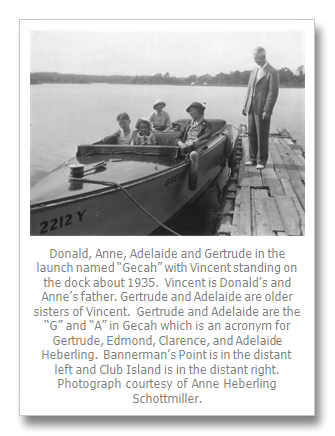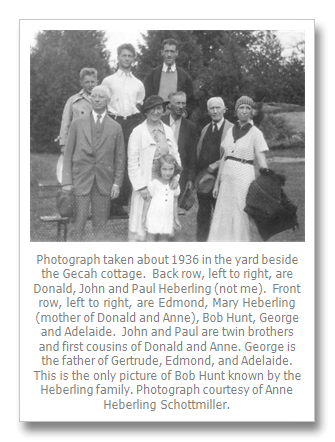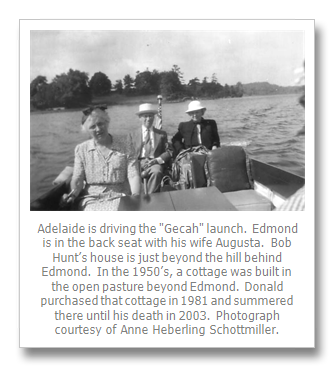After my father, Donald Heberling, died in 2003, I found two dozen essays he wrote during his plebe year at the United Sates Naval Academy. Considering how often a military officer gets transferred (the first 16 years of my life, I moved 16 times), it is amazing my father kept the collection.
These days, my wife Robin and I are working hard to downsize our possessions, but I have kept all my father’s papers. I can’t bring myself to throw out anything to do with family history. We now summer in the cottage my father bought in 1981 on Hill Island. Other family members have cottages in the Thousand Islands – all of us appreciating the place and the people.
One of the essays I found was written about Robert (Bob) Hunt. One wonders what the exact academic assignment was that led to this 700 word essay, and we are not sure of the grade, although there are comments written by the professor. What we do know is Donald Heberling admired this River man – Bob Hunt - and we can sit back and enjoy the memories.
Bob Hunt as I Knew Him
Written by Donald Heberling,
Midshipman, US Naval Academy, October 13, 1942
Bob Hunt was one of the most singular persons I have ever met. Essentially, he was a river man, but I have always contended that no mere phrase could even approach an accurate description of him. To me, he has always been an integral part of that section of the Saint Lawrence River known as the Thousand Islands. Each year, I manage to spend a few weeks of the summer season in this picturesque region, and until this year, Bob was always to be found at or near his small farm on La Rue Island, where our cottage is also located. He was always available when I wanted to know where the best pike were to be found, or what the best channel to such-and-such an island was. This year, with Bob gone over the Great Divide, I discovered that my vacation was, somehow, empty. I know now just how much my friend contributed to my previous unforgettable summers.

He was brought up in that very farmhouse where he lived when I knew him. At that time, everyone supposed him to be in his sixties. In this little ramshackle house, he lived until he died, engaging in the various activities typical of the Canadian native of the vicinity. Bob was not industrious however, but preferred to live from day to day, doing only the absolutely necessary chores, and postponing the others “until tomorrow.” This attitude was very plainly evidenced by the condition of his land and his various buildings. His barns and boathouses were in such a state that many have wondered at the magic which seemed to hold them together. When standing inside, one saw more the sky than of the skimpy, leaky roof. These buildings seemed to have taken the path of least resistance to the wind, and have long since lost any symmetrical appearance that they might have had.

Another example of Bob’s lack of industry is evidenced in the yard leading from the river to the house. In it, one may find anything from old boats and useless fish nets to decrepit bob sleds and empty beer and liquor bottles. Everything rests just where it has fallen, perhaps five, perhaps fifty years ago.
His farm, too, Bob worked with that carefree nonchalance peculiar to himself. His crops were one third the size of what they should have been. He was content to sell enough to buy a few bottles of liquor, and to let the rest wait until he again became somewhat thirsty. It was not an uncommon sight to hear Bob and his wife, Nellie, who was equally lax, singing their troubles away to the tune of a few bottles of their favorite rye whiskey, oblivious to the drastic state of disrepair in which their possessions existed.
Nevertheless, with all his short-comings, Bob was a friend, indeed. He loved to go fishing and to show someone his favorite haunts, in which to catch a few fine fish. He would get up in the early hours of the morning to escort some novice to his favorite blind, and introduce him to the thrills of duck hunting. He was happy when he was letting someone in on his “personal” secrets concerning the wildlife of the vicinity. He could tell some wonderful tales of the days when he was young, and Indians were not uncommon in that region.
Bob was an able woodsman and a crack shot with his rifle. Whenever the crows were feeding on his newly planted seeds, Bob would get out his trusty gun and make short work of several crows, more for the sport than for avenging the harm that they did.

Perhaps my most vivid memory of Bob is that of him coming in with his cows. They were constantly breaking through the old fences, weakened by the years, and scattering over the island. At length, after a trying search for them with one of his dogs, Bob would tramp home, with that triumphant grin on his weather-beaten face with the cows winding their way in single file before him. The tinkling of the cow bells was a symphony to him at a time like that, and he would look at you as if to say “Durned if those cows can hide from me for very long.” This one sentence exemplifies his attitude towards life. If he had wished he could have really prospered in his field, but he whiled away his life, happy to be alive, and taking joy in doing what he wanted, whenever he felt like it, to the extent which his state of mind happened to allow.
Presented by Paul Heberling
Paul Heberling was born in 1946 in Peoria, Illinois. At the time, his mother was staying with her parents because his father was on a navy cruiser in the Mediterranean. His father’s naval career meant moving an average of once a year, so the Thousand Islands became one of the few stable locations in his life. The early part of Paul’s career as an engineer was spent at GE’s corporate R&D center in Schenectady, N.Y. This allowed frequent visits to the Thousand Islands. Later, he was transferred to Ohio which allowed only one or two visits to the Thousand Islands each year. Since retiring, Paul and his wife Robin enjoy spending their summers on Hill Island.
|
|
Editor’s Note:
We appreciate being able to add this family photograph sent to TI Life after publication in April 2014, by Gloria Cruppi who read the article and realized it was about her relatives.
“Robert Hunt was born Robert Henry Hunt in1868. He was the son of Thomas Fitzmaurice Hunt and Hannora McGrath. Nellie Louise Poole was born in 1876. Nellie was my great-aunt, the sister of my Grandmother, Florence Irene Poole Cadue.
When Rob died, my mother brought Aunt Nell to live with us in Fairport, N.Y. She lived with us until her death.”
|